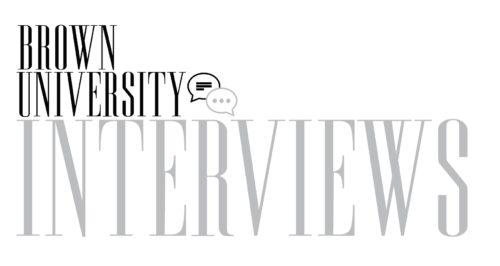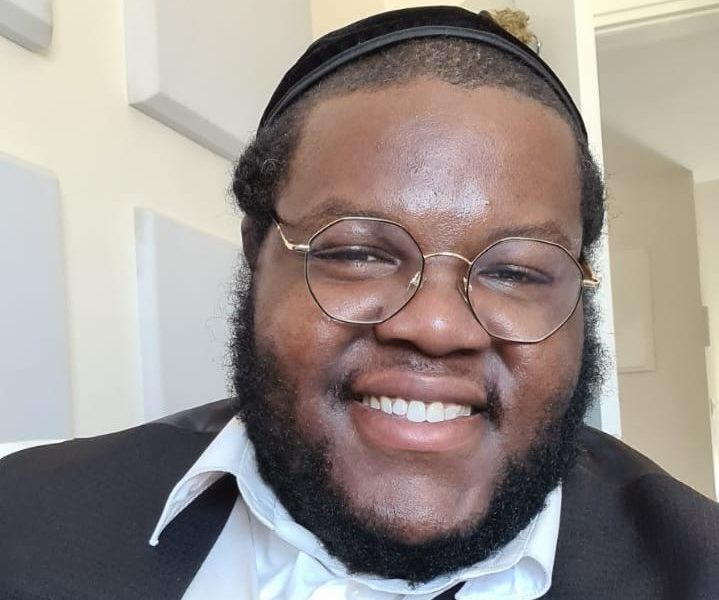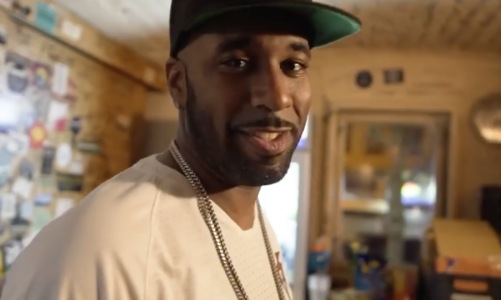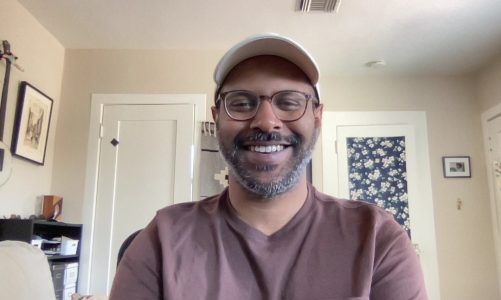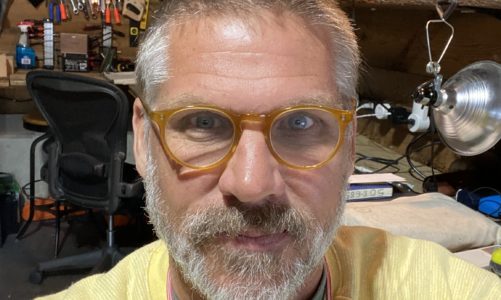
Self-described as Hitler’s worst nightmare, Nissim Baruch Black is a former gangster rapping gang member turned Chasidic Breslov convert on a mission to share Jewish spiritual traditions through authentic hip-hop culture. Though now known to fans around the world as Nissim Black from Israel, he was born Damian Jamohl Black in Seattle, Washington. He was raised as a Sunni Muslim before converting to Christianity at the age of 14, all while living in an Orthodox Jewish neighborhood. In his early twenties, he took a break from religion altogether and rapped under the name D. Black, before eventually converting to one of the most conservative sects of Orthodox Judaism in 2010. Shortly after his conversion, D. Black formally retired from music, eventually returning under his new legal name, Nissim Black, three years later. In early 2020, Nissim Black released his breakout single “Mothaland Bounce,” which combines African musical traditions with Jewish themes. As of this publication the song has been streamed over four million times.
*In July it was widely reported that Nissim passed away of COVID-19. Though he was hospitalized with Coronavirus, we are relieved to share that rumors of his death are false. He is not only home with his family, but already releasing new music.

Photo credit: Torah Box Music
Amelia Spalter: Your songs strike a poignant balance of being unapologetically spiritual without being, for lack of better words, abrasively righteous. How do you manage to make music with straightforward religious themes that is also accessible to, and genuinely enjoyed by, people who aren’t Jewish?
Nissim Black: The easy answer is that I come from a background that wasn’t Jewish. For instance, I wrote “Mothaland Bounce,” thinking to myself, “I know that if I say this that way, that’s going to make Black people feel like, ‘Wow, yeah.’ Then I know if I say this over here, that’s going to make Jewish people feel like, ‘Yeah, that’s right.’” When I go inside the booth, and I start writing and doing my thing, I have everybody in my mind with me. The biggest thing is, because my faith is Judaism, there’s no pressure to convert anyone. Jewish people are not trying to go preach to anyone or tell them they’re doing wrong. We believe you could be non-Jewish and still be making it happen in life, because we don’t believe that everyone has to be Jewish. Because of that, there is never any overall message intended to change who someone is. That’s what gives me the ability to balance between those lines a little bit more.
How was your relationship to your Blackness impacted early on in your conversion process, and how did it evolve as you became famous, in part, for being Jewish?
In the beginning, I didn’t even think about it as much. Initially I would say I tiptoed into it because I was thinking, “How are people going to treat me? I don’t look like anybody over there.” Then after learning that there were more people of color who were also Jewish, it gave me the confidence to go forward with it, and immediately after I did, I didn’t even think about my color or how different I was from the other people around me unless somebody else brought it up. There were a few people who asked me “Now that you’ve become Jewish and understand the whole greatness of Torah community, what are you doing with that knowledge for the African American community that you came from?” Contemplating that was probably what led to “Mothaland Bounce” and my subsequent whole new wave of music, because I was like, “You know what? I hadn’t even thought about it.” I was so busy running forwards in life that I didn’t take the time to look back and realize, “Hold on, I could still be a positive role model and be influential for kids who grew up in the same neighborhoods as me.” So, years later, when I recognized that responsibility, I started to realize I have a double mission here.
Did your mission have anything to do with why, of the varying degrees of established Judaism, you choose to convert to one of the most Orthodox sects in existence?
The truth is that I didn’t think about it. It was one of those things, like I always talk about, where my heart was blazing for closeness to G-d. I was praying and I just let my heart really lead me down my path. Even after I converted, I didn’t wear the shtreimel (שטרײַמל) and Shabbos hat at first. I went with a black hat, but it was a different kind of black hat. As time has gone on, I’ve allowed my heart to lead me to the place that felt most spiritually fitting. Also, I’m a hater of sects. I don’t like the fact that, at least on a religious level, there’s “conservative” and “reformed”. That wasn’t in my head. My thing was like, “Okay, I grew up in a Jewish neighborhood. I’m just going back to that.” I didn’t give too much thought as to the specific details of the religious preferences I would be observing, I was just like, “My heart’s looking for a place of G-d, and I’m going wherever I can find one.”
I know you’ve said you didn’t engage with Jewish culture until later on in adulthood, but to what extent do you think growing up in a Jewish neighborhood had an influence on your eventual interest and subsequent conversion?
It was a big point of reference, a bookmarker, for me as I started to grow on my own. As I started my own spiritual journey, I was able to go back and be like, “Hey, I know where I can go to a shul.” “I know someone I can go to to ask questions.” I think it had something of what we would call a hashpa’ah, (השפּעה) meaning essentially that it influenced me indirectly. It wasn’t like growing up I said “I’m not going to ride my bike on Saturdays because everyone else in the neighborhood is walking.” Those are not the types of things that got me interested in Judaism, but it was another point of reference, right? Growing up surrounded by the traditions and the synagogues gave me a sense of familiarity that made it that much easier to convert. In fact, I used to ride my bike in the parking lot of a local synagogue all time, and years later it would be the synagogue I converted in.
You’ve said that your father, who is a doctor of Christian theology, was the most accepting of your decision to convert, but your secular family were the least accepting. Why do you think that was?
By now the rest of my family has come around, but at the beginning, it was difficult because when you come from a very tight family like I do, your connection is largely based on the fact that you’re around each other all the time. So when my wife and I converted to Judaism, and my family reacted by basically being like, “You guys can’t be around us,” that was big. My father kind of understood because he had already had to make this leap in his own way within Christianity, and today he is a changed man.
My father was a very big drug dealer back in the day, so he’s experienced having to get away from old friends and things like that in order to change his life, and he could really see this transformation happen for me. Although parts of it were maybe too foreign for him to personally recognize, he was very, very accepting. He loved that I wanted to serve G-d so much that it didn’t matter if I did it his way or another way. He’s always just said that he’s happy I’m growing and he’s very proud of me. Even though my family wasn’t very accepting at the beginning, they did come around and are now like, “Okay, you know what, you found what works for you, and that’s great.”
You had to field some jarringly ignorant questions early on in your spiritual journey such as, “Are you still Black even though you’re Jewish?” Did those die down eventually, or do you get them even now?
They still exist, just not so much from family and friends anymore. It’s what was leading up to this song “Mothaland Bounce.” I felt like it was something that I needed to say. And everybody thinks it’s maybe because of discrimination in the Jewish world, but I’m actually getting it on both sides, because Black people see me and aren’t sure what to think either. There are also people who say, “Oh, you’re a traitor,” or “So you left your roots behind?” I’m not, and I did not. I wanted to make a statement with this song, a very, very clear one, so that people would stop asking those questions.
What I’ve seen it do is people who didn’t know how to interpret all of this, even from as far back as high school where I thought things between me and everyone were fine, are only just recently since hearing that song reaching out like, “I got you now, bro. I didn’t understand what you were doing, but now I see you and I’m happy for you.” I’m getting a lot of that from people from many different points in my life. I found it very challenging to remain relatable to and maintain a connection with people who I’d had a relationship with before. Over the last two years I’ve been back in touch with family and friends because I felt a very deep need to be more relatable in order to strengthen those connections again.
There is a lot of humor, both in your lyrics and your music videos. Is that done deliberately as a Breslov to help people find joy in serious religious topics, or is it just an organic piece of who are you, religion aside?
Yeah it is, all of it is who I am. On both sides that you mentioned—On one side, things needs to be eased back a little bit, because I felt like if I had been super serious in that video, then the record could have come off harder than how I wanted it to sound from the Jewish perspective—on the other side, I am mindful that I’m saying things that reveal my affection for G-d and concern my faith. It’s as much about how I say things in the videos as it is what I say, because I don’t want to come off as, “Maybe he’s just trying to preach,” I want familiarity.
In that same vein of growth and change, you’ve often cited that a major inflection point for you was when a feud over a diss track escalated out of hand, before your conversion. If someone came at you with a diss track in the present day, how would you respond?
Today I’m in a much more peaceful place. That person would just have to enjoy the crickets. It depends on the situation, but I think it would be complete silence. There isn’t any need for me to respond to things that are below me. I have a wife, I’ve got kids, I have to live my life. I’m so focused on my mission to be able to inspire people, that I can’t even get into that same type of space. It would be a waste of time for someone to make a diss track about me, so I hope that everybody will just save their breath. Depending on the situation, I might make them look silly, like, “You got to go pick on a religious guy? That’s what you’re going to go do?” Because it’s like, “You’d be better off going at somebody else who thinks he’s the champion of the whole entire world.” It’s also a death blow for them because, I got G-d on my side. That’s my crew. You really want that? But ultimately, I don’t think it would be worth my responding to anything like that. It’s not the show you’re going to get out of me.
You’ve said that you don’t feel young Jewish kids should aspire to hip-hop careers as their first choice. But your mother was a hip-hop artist, your father was a hip-hop artist, and you are a hip-hop artist, so what if your kids have the genetic gift?
When that was said, I was primarily talking to kids who are growing up outside of that culture. I was mostly getting that question from a lot of young Jewish kids who are inside of yeshivas. They’re still learning, and they should focus on that. My connection to hip-hop music is, like you said, that this is what I’ve been my whole entire life. For me to be able to use something that G-d gave me is good, but I’d never push a person to go into hip-hop. It’s nothing against my peers, I’m just saying that today a lot of these young guys are looking at a reflection of a culture of hip-hop, and they may get excited about it, but what they’re seeing doesn’t really have anything to do with what their purpose is.
My job as a religious leader inside the community is to keep these young people learning and growing in their spiritual life. Every person needs to challenge whether or not the things in their life are really helping them grow. My way of thinking is not against hip-hop, it’s against jumping into things that aren’t really going to help you grow. I don’t encourage it, but at the same time, I never get in the way of what G-d wants, and that’s ultimately the biggest thing. I also never put those limits on it because I hate when people try to tell me, “Oh, this is wrong for you to make hip-hop and to be Jewish and do all that at once.” You don’t know what experiences I’ve had with HaShem and what I’ve had with my rabbis and the people who were close to me. These types of things are not black and white.
I can’t tell somebody, “You can’t,” so it’s the same thing for my own children. It was a challenge for me to balance this out, because my kids have grown up Jewish their whole entire life. They have no idea what type of lifestyle I had before. But I’m starting to it see as they’re getting older. My daughter, she really likes singing and dancing, my sons too. If that’s their purpose in life, that’s their purpose in life, I never want to get in the way of that. But, ultimately, I want to be able to give them another option, because a lot of what we’re taught in the Black community is that your only way out is hip-hop and some type of sports or something similar, and that’s not true. I want to be able to give them as many options as I possibly can before I try saying “Oh, you have to stop that,” because if you keep going even then, that’s when it shows it’s what you’re really made to do.
You made aliyah (immigrated to Israel) in 2016, and your children were discriminated against when you tried to enroll them in local Haredi yeshivas. What happened and how did you respond?
Yeah, it was very challenging. The school system in Jerusalem is very hard, so even though it’s a rainbow of different colored Jews, we had some issues. One of our biggest things is because of the thrust of fiery authenticity with which we came into with Judaism, we were always led into circles that don’t usually involve peoples of color. People of color generally try to keep to themselves because certain things they experienced made them feel that, culturally, that it would be safer and easier for both us and them. I know I always look around and just be like, “Oh yeah, I’m the only brother here.” In the school system, as with any of these circles, we just pushed through until we had friends. We did receive some kickback there, but retrospectively, I’m so happy that it did happen because we moved to a beautiful community where our kids were accepted with love.
I didn’t want that to get out in the media, because I ultimately didn’t care about it. It was just, “Okay, we’ll move on and go where they want us.” But it was a very, very hard challenge to know that your level of religiosity and your family’s values aren’t enough to get your kids accepted into certain schools because of color, because of cultural differences, or in some instances because of my music. Some of it was because I make hip-hop music, which is interesting because all the kids from the school, they knew who I was. But you can’t move to Israel without having some type of a hard time, that was just embedded in the land, and we got through it. We’re very happy now in an awesomely religious community that was very, very much so our speed and our flavor. That was just a little hurdle that we had to get over to get here.
You’ve talked about how there’s been a lot of violence in the United States between Orthodox Jewish community and the Black community. What do you think the genesis of that is?
It’s a lack of dialogue. I always say this but being both African American and Jewish and being able to see both sides of the struggle, I really don’t know how many people have gone through as many trials as these two groups have. Black people and Jewish people have had to share a lot of the same neighborhoods, even in places where this tension is high, like in New York. Crown Heights, for instance. There’s a reason that has been able to work, and it gives me hope that if the proper dialogue were to happen then the connections could be made to generate more support for one another rather than furthering these misperceptions about one another. There is a conversation that hasn’t happened and it’s creating a lack of understanding about where each side is coming from.
You formally retired when you converted. So, when did you return to music after becoming Jewish, and how did you first approach readapting your style to embrace the present without overshadowing the past?
Technically, I hung up my cleats at the end of 2009. When I actually started my conversion process in 2010, I had a project that I recorded earlier that got released and did a few more shows, including South by Southwest, in late 2010. At the beginning of 2013 is when I decided to come back, which was challenging for me, because I had no idea there was a Jewish music scene. I just started, I didn’t really know where I wanted to go. I focused so much on not sounding like what I did before, that I didn’t even sound like me anymore. I was still trying to get myself back. Then I had the opportunity to do “Hashem Melech” which was a collaboration I loved with Gad Elbaz that came out 2015. That led me to realize “Hold on, this is a Jewish music scene. I never knew about this.” I always looked at music as a tool, like “It’s going to enable me to have the conversations that I want to and to be able to inspire who I want to,” and I felt like this did that. So I just kept on developing. Then I released my album Gibor. It came out this December, but by the time it dropped the records were like a year old already. So that was this middle place before “Mothaland Bounce” of me trying to get back and asking, “How do I settle my two worlds? Because I have a koach, a power and strength, but I have the hip-hop that is just sitting dead.”
Many rappers talk about G-d constantly, but they’re not automatically labeled “Christian rappers,” they’re just rappers who are Christians. Being of a minority religion, the opposite assumption is made about you. So let’s clarify it once and for all, are you a “Jewish rapper” making Jewish music or are you a rapper who is also Jewish?
I would say the latter. I am a rapper who happens to be Jewish and because of that, Judaism is my filter. My filter isn’t going to go outside of anything that I feel or I believe. I happen to be a rapper who is Jewish, therefore, people always have this thing with the “Jewish music,” which is one of the things that has really annoyed me over the years. This is no hit at any of my Jewish music peers or anything like that, but to be honest, they’re taking stuff from non-Jewish music all the time. People who are very religious, they have no idea, so they just think, “Oh, this is mainstream Jewish music.” If you want to talk about Jewish music in its purest form, it’s maybe Shlomo Carlebach, Eitan Katz and Shlomo Katz, I don’t know, just in that vein. But outside of that, once we start getting into live instruments and beats and all that it’s like, “Are we really calling those Jewish music? That’s what Jewish music is? Does that necessarily have to be Jewish music, or could it really be more about music that inspires people and gets them up and going?”
It’s a very, very tough thing for me, but I would definitely say that’s the biggest difference between what’s overtly Jewish and what’s just kosher for a religious person. Just like certain foods for example. Now, we can say that eating fresh foods, vegetables and all those things that are really healthy for you, only that’s really kosher. But we know that’s not true. We’ve got Kashrut (כַּשְׁרוּת) on everything, even Pepsi and Coca-Cola. Everybody finds a way to get their steak with greasy fries and brisket. This is definitely one of those things where, when it’s kosher and if you do it the right way, it’s even healthy, especially for those who are already involved in the culture. It’s coming from a higher level. Like when I made this last record, everything was so open and I was really dealing with deeper issues, but doing it in a way that provides a Kosher alternative to the other stuff out there. That’s my mission.
What do you think about Kanye classifying his music as gospel while simultaneously incorporating distinctly secular themes?
It’s great. I feel like it needs to be that way. A friend who used to be involved with RCA would say, “We need music for Monday through Saturday, not just music for Sunday.” If Kanye is the person to fill that void, I’m so happy it’s him who’s decided to do it. Now listen, it’s a different faith from mine, but I come from a Christian background. I’m very appreciative and thankful for my years of Christianity, because it helped give me things that prepared me for Judaism. To see Kanye take a stand like that is exciting. Whether I agree or disagree with everything that he’s saying is another question, but I’ve always liked that about Kanye. Whatever he had to say, whether it was from speaking out against George Bush to then supporting Trump to then putting out a gospel record to whatever is next, he was being who he was. In a way it was similar with “Mothaland Bounce,” because I have to do that in the religious world too. A lot of people think that because I didn’t grow up inside this religious system, I can’t find my own way. I remember my friend saying when he got to yeshiva, “Rabbi, I just met you, but I knew G-d before I got here.” That was the philosophy that led me here. I’m always looking to what G-d wants for me first, and I’ve always enjoyed that about Kanye too. I’m excited to see what the future holds for him and I hope he keeps putting out inspiring music and stays bold enough to talk about G-d.
You can’t listen to mainstream hip-hop anymore for religious reasons, so who else in your playlist right now that you’d recommend we check out?
I almost don’t listen to anything so much anymore. I think Lecrae is dope. He’s been holding it for a long time in the Christian rap world, same with Derek Minor and his guys over there at Reflection. I listen to Zusha, even though it’s not hip-hop. I listen to Levi Robin, who isn’t hip-hop either. One guy who I’ve been really, really impressed with rap-wise is NF. I also like him because I can’t recommend cursing and all the other filthy stuff that people talk about. Drake is Jewish, but does he even count anymore? Post is dope, I like Ty Dolla, there’s a lot of guys out there. Roddy’s making his noise right now. I think those guys are all talented, but I don’t really know, because I can’t listen to them. I barely listen to music at all, period, outside of making it. Because my level of energy as an artist is so strong that, when I am listening, I’m usually listening to the opposite of what I make. Very soft, mellow, folk music, classical, that type of thing, that’s really my speed. I understand why it doesn’t get the party going, but soft music, that’s my go-to. I’m very laid back.
There have been a few articles about “Mothaland Bounce” that say it’s Nissim Black “reintroducing himself.” Are you reintroducing yourself, and if so, how is the new Nissim different from the old one?
Yeah, I guess that would be accurate, because over the last few years most of the records have been very Jewish-focused. Most people outside of Judaism haven’t been able to fully understand what I’m saying because even though it’s mostly English, the moments here and there in which I do use Hebrew add a really important nuance. The difference with this record is it’s saying, “You know what, I’m still capable of competing on the higher stages with any kind of hip-hop artist that’s out there.” So I’m reintroducing myself from a sonic level. It’s not so much that the message is changing, it’s just going to be accessible to a broader audience as opposed to now where someone may not get it unless they understand the nuance of what I’m trying to say. People who are in the culture already understand what I’m saying, but I wanted to be able to make the message broader. So, yes, I am reintroducing myself. Because it’s been years since I’ve made records on this level.
*This interview has been edited for length and clarity.
